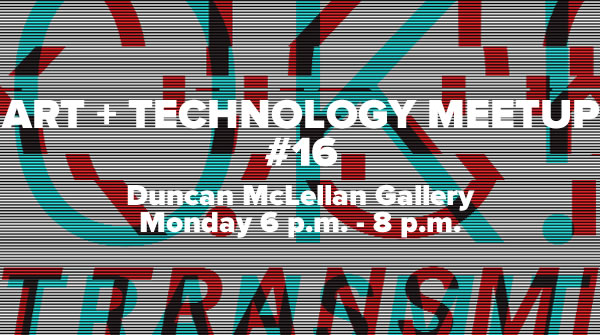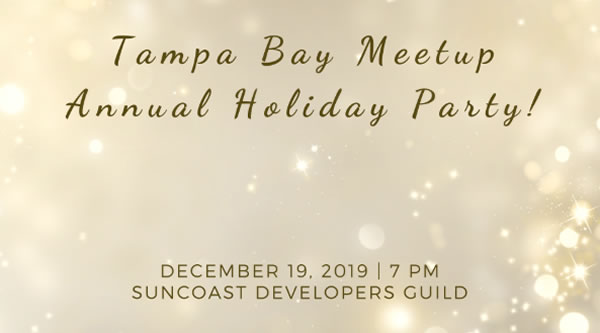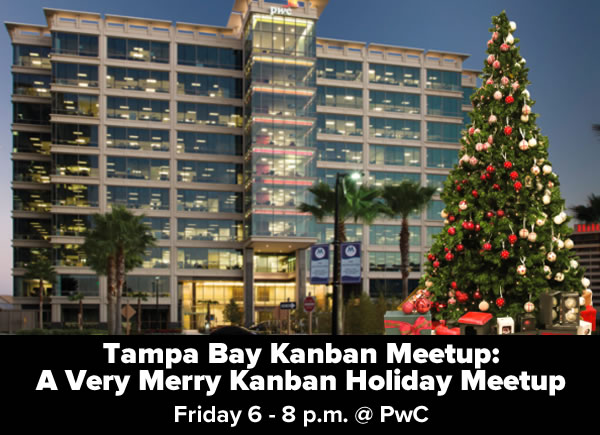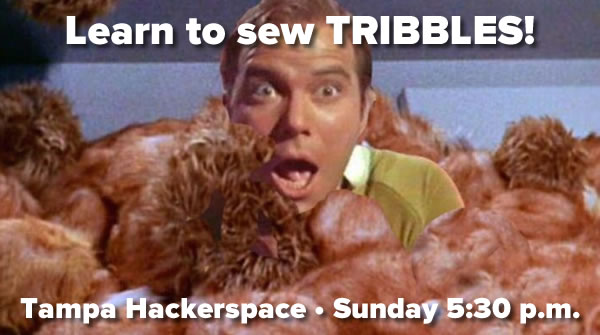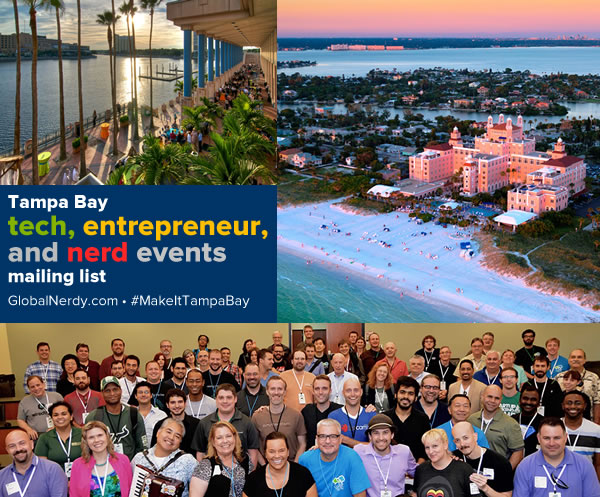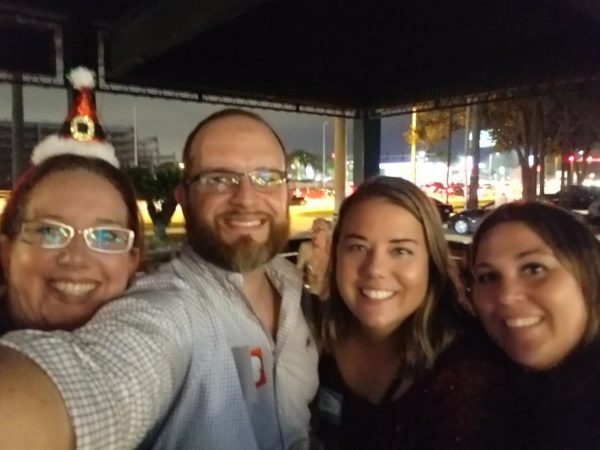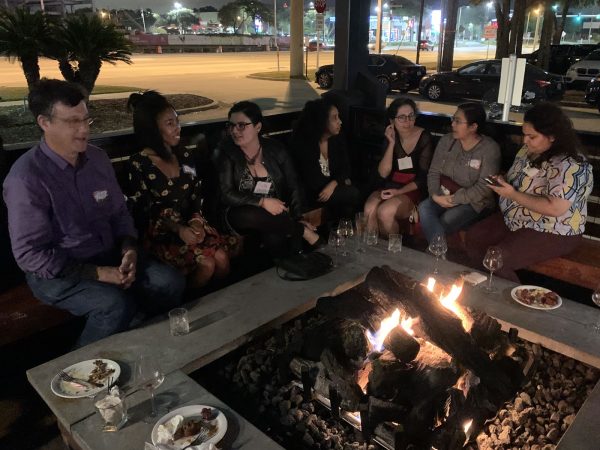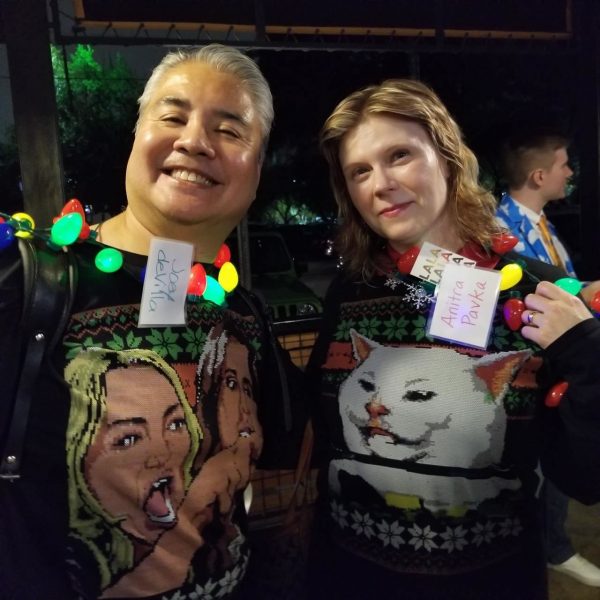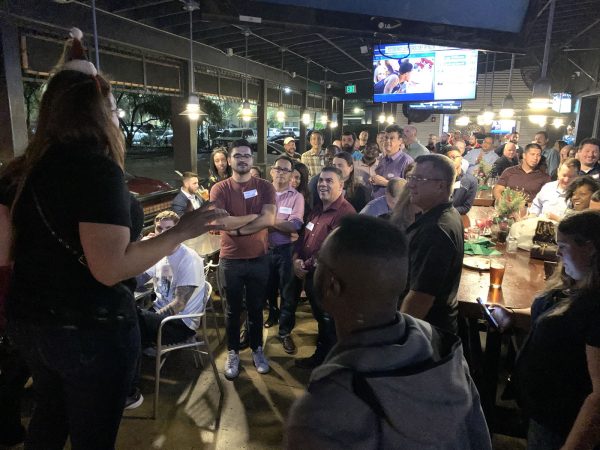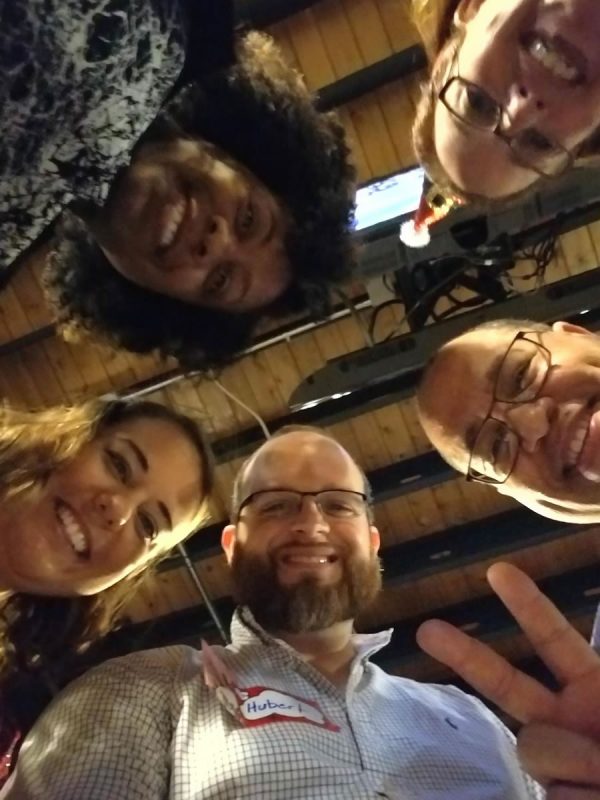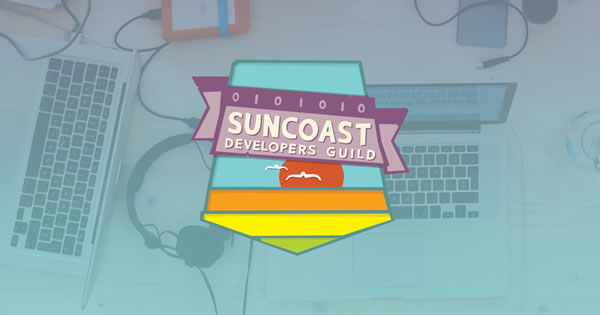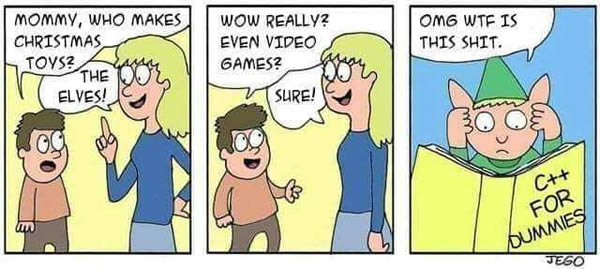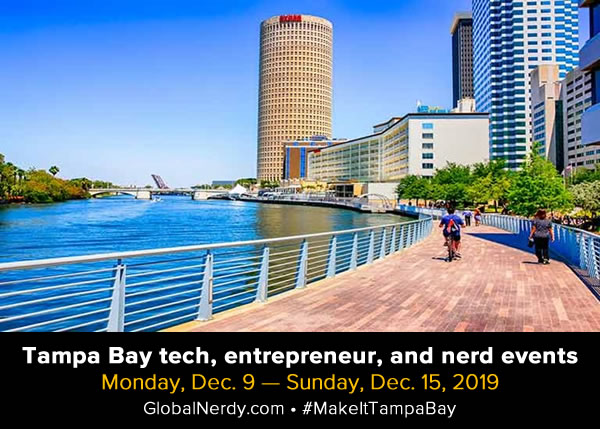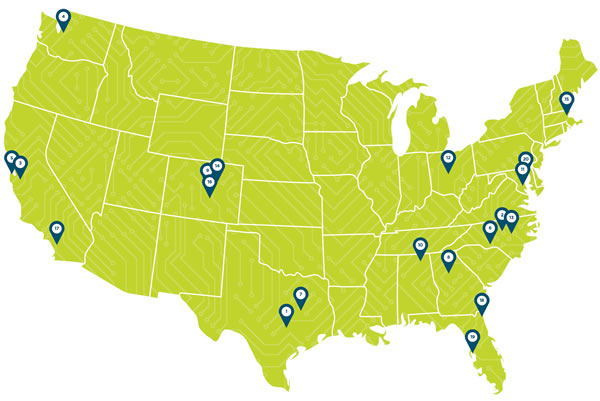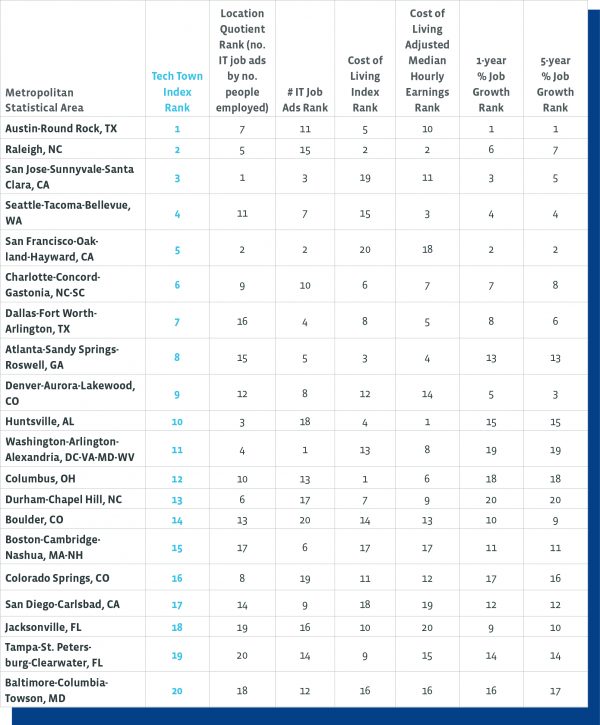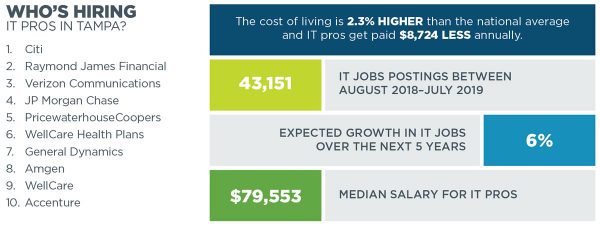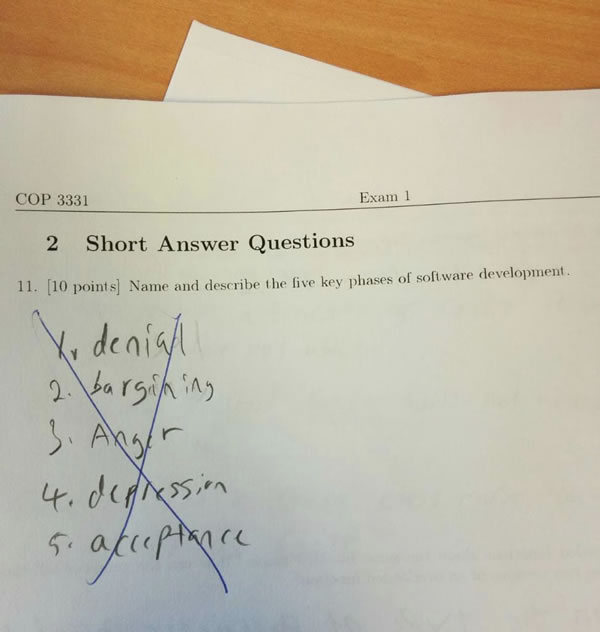
It’s the last “Tampa Bay tech events” list of 2019…and of the decade!
The time around Christmas always sees a sharp decline in tech, entrepreneur, and nerd events, which is why this edition is listing the events for the last two weeks on the year. I hope you had a great 2019, and I’ll see you in 2020!
This weekly list, which I started in 2017, has been around for about three years. and I hope you’ve found it useful. The mailing list version is a relatively new thing — thanks to Justin Davis for the suggestions — and will continue into the new year and the new decade.
Monday, December 16
- Learn Cybersecurity Tampa — Daily Campus Tours – SecureSet Tampa @ SecureSet, 10:00 AM to 10:30 AM
- Lean Beer for Software Craftspeople (Christmas Edition) @ Crooked Thumb Brewery, 5:30 PM to 7:30 PM
- OK! TRANSMIT Art + Technology Meetups — Art + Technology Meetup No. 16 @ Duncan McClellan Gallery, 6:00 PM to 8:00 PM
- America’s TriviAddiction — ROOKIES SPORTS BAR – SPRING HILL – LIVE TEAM TRIVIA !!! @ 6:00 PM to 8:00 PM
- Tampa Bay DevOps Meetup — TBDevOps: Network as a Code @ Wolters Kluwer, 6:30 PM to 9:00 PM
- Cool ‘n Confident Toastmasters @ SPC – St. Petersburg/Gibbs Campus, 6:30 PM to 8:00 PM
- America’s TriviAddiction — 3 DAUGHTERS BREWING – ST. PETERSBURG – LIVE TEAM TRIVIA @ 7:00 PM to 9:00 PM
- Pen Turning Class (Day 1 of 2) @ Tampa Hackerspace West, 7:00 PM to 9:00 PM
- South Tampa Toastmasters HOLIDAY TOY DRIVE AND PARTY! @ Unity of Tampa, 7:00 PM to 8:15 PM
Tuesday, December 17
- Elevated for Success Women’s Networking Group — Connect and Chat – Roundtable Mastermind @ 9:00 AM to 11:00 AM
- Young Professionals of Tampa Bay Networking Group — Carrolwood Networking Lunch McAllisters Deli @ McAlister’s Deli, 11:30 AM to 1:00 PM
- Westshore Toastmasters @ FIVE Labs, 12:00 PM to 1:00 PM
- Brandon Boardgamers — Tuesday Night Gaming @ Cool Stuff Games, Cool Stuff Games
- Tampa SQL User Groups — Pinellas – Monthly Meeting @ St Pete College – EpiCenter, 6:00 PM to 9:00 PM
- Learn Cybersecurity Tampa — Intro to PowerShell @ SecureSet, 6:00 PM to 8:00 PM
- Qlik Meetup: Tampa Xmas networking Event @ Miller’s Ale House – Tampa Airport, 6:00 PM to 8:30 PM
- Weekly Open Make Night @ Tampa Hackerspace, 6:00 PM to 10:00 PM
- Tampa Bay Power BI User Group — Designing and Developing Power Apps Portals @ Microsoft Office, 6:00 PM to 8:00 PM
- Suncoast Developers Guild — Whiteboard Challenges @ 100 5th St S, 6:30 PM to 8:30 PM
- WordPress St. Petersburg — To Be Announced: Scheduled Talk @ Suncoast Developers Guild, 6:30 PM to 8:30 PM
- West Pasco Toastmasters Club #2824 — Weekly Meeting @ West Pasco Board of Realtors, 6:30 PM to 8:00 PM
- America’s TriviAddiction — HERNANDO OAKS GOLF AND COUNTRY CLUB – BROOKSVILLE – LIVE TEAM TRIVIA !!! @ 6:00 PM to 8:00 PM
- Spirited Toastmasters @ St Stephens Catholic School, 6:30 PM to 8:00 PM
- Game Club Tampa Meetup — Tuesday Nite Roleplayers (RPGs) [Full] @ Grand Arena of Mind Expansion, 6:30 PM to 10:30 PM
- America’s TriviAddiction — WESTSHORE PIZZA – BELLEAIR BLUFFS – LIVE TEAM TRIVIA !!!, 6:30 PM to 8:30 PM
- St. Pete Beers ‘n Board Games Meetup for Young Adults @ Flying Boat Brewing Company, 7:00 PM to 10:00 PM
- Nerdbrew Events — Pints & Pixels @ Yard of Ale!, 7:00 PM to 11:00 PM
- America’s TriviAddiction — DAIQUIRI SHAK RAW BAR & GRILL – MADEIRA BEACH – LIVE TEAM TRIVIA, 8:00 PM to 10:00 PM
Wednesday, December 18
- Downtown St Pete Networking at the Hangar~ Wednesday Mornings @ The Hangar Restaurant & Flight Lounge, 7:30 AM to 9:00 AM
- 1 Million Cups St. Pete — Exotic Mobile Marketing / How Did We Serve You? @ St. Petersburg Greenhouse, 9:00 AM
- 1 Million Cups Tampa — Rojas Fitness / Bits4Bots LLC @ Entrepreneur Collaborative Center, 9:00 AM
- Tampa Bay WaVE — OPEN/FREE Coworking for Veteran Entrepreneurs @ FirstWaVE Venture Center, 9:00 AM to 6:00 PM
- Young Professionals of Tampa Bay Networking Group — Bernini of Ybor Lunch Networking @ Bernini (innovative italian cuisine), 11:30 AM to 1:00 PM
- Young Professionals of Tampa Bay Networking Group — Brandon Business Professioanals @ Carrabba’s, 11:30 AM to 1:00 PM
- Business to Business Networking Group — B2B Members Only Holiday Event @ Carrabba’s Italian Grill, 12:00 PM to 1:15 PM
- WITI – Tampa Bay (Women in Technology International) — WITI Tampa Annual Holiday Party @ 2202 N Westshore Blvd, 5:30 PM to 8:30 PM
- Learn Cybersecurity Tampa — SecureSet Info Night Tampa @ SecureSet, 6:00 PM to 7:00 PM
- Divi Tampa Inaugural Meetup @ AMRoC FabLab, 6:00 PM to 8:00 PM
- St. Pete Podcasters — ST PETE POD | DECEMBER MEET-UP @ Suncoast Developers Guild, 6:30 PM to 8:30 PM
- DefCon813 — CigarCitySec @ 7:00 PM to 9:00 PM
- Pen Turning Class (Day 2) @ Tampa Hackerspace West, 7:00 PM to 9:00 PM
- Central Florida Red Hat User Group (CFRUG) — CFRUG December meeting; demos! @ Tech Data Corporation, 7:00 PM to 9:00 PM
- Tampa Bay Bitcoin — Bitcoin/Blockchain Meetup: Networking, News, Q&A @ Coastal Cantina and Grill, 7:00 PM to 9:00 PM
- Carrollwood Toastmasters Holiday Party @ Arthenia L. Joyner University Area Community Library, 7:00 PM to 8:30 PM
Thursday, December 19
- Tampa Bay Connections — MELLOW MUSHROOM THURSDAY’S NETWORKING LUNCH @ Mellow Mushroom, 11:30 AM to 1:00 PM
- Tampa Professional Networking Meetup — Happy Hour Networking – Cigars, Fine Wines and Brews @ Long Ash Cigar Bar, 5:00 PM to 8:00 PM
- Innovators of Tampa Bay (IoT) PDMA — Holiday Social – Innovators of Tampa Bay @ The Crafted Plate, 5:30 PM to 8:30 PM
- Lean Beer for All Things Agile (Tampa) @ The Pub (at Bay Street in Int’l. Plaza), 6:00 PM to 7:30 PM
- FL Biz Incubator EVENING Spark Tank This Week! @ Cotherman Distilling Co., 6:00 PM to 8:00 PM
- cYbor Secruity Meetup — Hacking The Dollar (Members Only) @ The Undercroft, 6:00 PM to 8:00 PM
- America’s TriviAddiction — CRESCENT OAKS COUNTRY CLUB – TARPON SPRINGS – LIVE TEAM TRIVIA !!!, 6:00 PM to 8:00 PM
- America’s TriviAddiction — CAPTAIN’S CORNER – BROOKSVILLE – LIVE TEAM TRIVIA !!! @ 6:00 PM to 8:00 PM
- America’s TriviAddiction — BAYSCAPE BISTRO AT HERITAGE ISLES – NEW TAMPA – LIVE TEAM TRIVIA !!! @ 6:30 PM to 8:30 PM
- America’s TriviAddiction — LAKE JOVITA GOLF AND COUNTRY CLUB – DADE CITY – LIVE TEAM TRIVIA !!!, 6:30 PM to 8:30 PM
- Suncoast Developers Guild and more — Annual Holiday Party! @ Suncoast Developers Guild, 7:00 PM to 9:00 PM
- 3D Printer Deltamaker Orientation (members only) @ Tampa Hackerspace, 7:00 PM to 8:30 PM
- Game On — Second Game @ Bullfrog Creek Brewing Co., 7:00 PM to 9:00 PM
- Lit Ladies Bookclub — Book Swap @ 7:30 PM to 9:30 PM
Friday, December 20
- Tampa Bay Connections — Tampa Bay Networking Friday Lunch~ @McAlister’s Deli, 11:30 AM to 1:00 PM
- Tampa Professional Networking Meetup — Happy Holidays! Let’s Do Lunch – Carrollwood – Resumes in January @ Grillsmith, 12:00 PM to 1:00 PM
- Tampa Bay Kanban — A Very Merry Kanban Holiday Meetup @ PricewaterhouseCoopers LLP, 6:00 PM to 8:00 PM
- Tampa Bay Young Professionals Group — Holiday Social at ū·lë·lē’s Sunset Lawn @ 7:30 PM to 10:30 PM
Saturday, December 21
- Code for Tampa Bay Brigade — End of Year Updates and Social @ AMRoC FabLab, 11:00 AM to 1:00 PM
- Critical Hit Games — CHG Store Christmas Party @ Critical Hit Games, 12:00 PM to 11:00 PM
- Tampa Hackerspace Holiday Board Gaming and Pot Luck @ Tampa Hackerspace, 1:00 PM to 7:00 PM
- Kakoii-Otaku Clan — Star Wars: The Rise of Skywalker (AMC Veterans) @ 1:00 PM to 4:00 PM
- Tampa Unity User Group — Game Project Therapy @ Waypoint 6 Tavern & Geekery, 4:00 PM to 7:00 PM
- Page Turners — Planning Dinner for 2020 @ 5:00 PM to 7:00 PM
- Gekkocracy! — Ugly Sweater Party at Brewlands Billiards @ Brewlands Bar and Billiards, 8:00 PM to 11:00 PM
Sunday, December 22
Monday, December 23
- America’s TriviAddiction — ROOKIES SPORTS BAR – SPRING HILL – LIVE TEAM TRIVIA !!! @ 6:00 PM to 8:00 PM
- America’s TriviAddiction — 3 DAUGHTERS BREWING – ST. PETERSBURG – LIVE TEAM TRIVIA @ 7:00 PM to 9:00 PM
Tuesday, December 24
- America’s TriviAddiction — WESTSHORE PIZZA – BELLEAIR BLUFFS – LIVE TEAM TRIVIA !!! @ 6:30 PM to 8:30 PM
- America’s TriviAddiction — DAIQUIRI SHAK RAW BAR & GRILL – MADEIRA BEACH – LIVE TEAM TRIVIA @ 8:00 PM to 10:00 PM
Wednesday, December 25
(No events)
Thursday, December 26
- America’s TriviAddiction — CRESCENT OAKS COUNTRY CLUB – TARPON SPRINGS – LIVE TEAM TRIVIA !!! @ 6:00 PM to 8:00 PM
- America’s TriviAddiction — CAPTAIN’S CORNER – BROOKSVILLE – LIVE TEAM TRIVIA !!! @ 6:00 PM to 8:00 PM
- America’s TriviAddiction — BAYSCAPE BISTRO AT HERITAGE ISLES – NEW TAMPA – LIVE TEAM TRIVIA !!! @ 6:30 PM to 8:30 PM
Friday, December 27
- Tampa Bay Connections — Tampa Bay Networking Friday Lunch~ @ McAlister’s Deli, 11:30 AM to 1:00 PM
- Creative Content Mastermind — Post Santa Claus Presentation Friday! @ Cowork LWR, 6:00 PM to 9:00 PM
- Tampa Bay Young professionals Group — Let’s go Ice Skating at a beautiful rink in Clearwater (pro rink-North). @ 7:00 PM to 9:00 PM
- Geekocracy! — Bowling at Pinchasers Armenia @ Pin Chasers Midtown, 8:30 PM to 10:30 PM
Saturday, December 28
- Creative Content Mastermind — Expert Status Content Creation Day [Paid Event] @ Cowork LWR, 9:00 AM to 7:30 PM
- Tampa Bay Thinkers — Kalifornia Katherine hits Tampa like a wildfire! @ 1:00 PM to 11:00 PM
- Geekocracy! — Vortex Barcade Saint Pete @ The Vortex Bar and Game Room, 8:00 PM to 11:00 PM
Sunday, December 29
Monday, December 30
- America’s TriviAddiction — ROOKIES SPORTS BAR – SPRING HILL – LIVE TEAM TRIVIA !!! @ 6:00 PM to 8:00 PM
- America’s TriviAddiction — 3 DAUGHTERS BREWING – ST. PETERSBURG – LIVE TEAM TRIVIA @ 7:00 PM to 9:00 PM
Tuesday, December 31
- Tampa Bay Connections — New Tampa Business Networking Lunch~~ @ Glory Days Grill, 11:30 AM to 1:00 PM
- Weekly Open Make Night @ Tampa Hackerspace, 6:00 PM to 10:00 PM
- Geekocracy! — Happy Geek New year! @ Seminole HardRock Hotel Casino, 10:00 PM to 2:00 AM
Do you have an upcoming event that you’d like to see on this list?
If you know of an upcoming event that you think should appear on this list, please let me know!
Join the mailing list!
If you’d like to get this list in your email inbox every week, enter your email address below. You’ll only be emailed once a week, and the email will contain this list, plus links to any interesting news, upcoming events, and tech articles.
Join the Tampa Bay Tech Events list and always be informed of what’s coming up in Tampa Bay!
